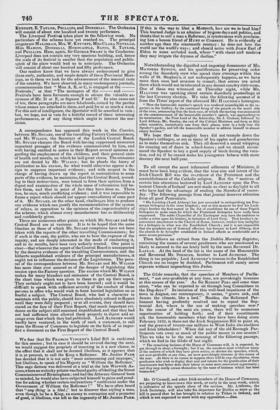A correspondence has appeared this week in the Courier, between
Mr. STUART, one of the travelling Factory Commissioners, -and Mr. WILSON, the Secretary of the London Central Board. Mr. STUART charges the Board with having suppressed numerous important passages of the evidence communicated by him, and with having omitted to notice in their Report several opinions re- garding the employment of the children, and their general state of health and morals, on which he laid great stress. The omissions are not denied by Mr. WiLsost; but he pleads the hurry of publication as his excuse, for• what would otherwise appear a de- sign to suppress important evidence; and with respect to the • charge of having drawn up the report in contradiction to some parts of the evidence, he maintains, that the Central Board, accord- ing to their instructions, were hound to form their opinion from a digest and examination of the whole mass of information laid be- fore them, and that in point of fact they have done so. There was, be says,. much conflicting evidence ; and it was impossible to frame a report which should not appear contradictory of some part of it. Mr. STUART, on the other hand, challenges him to produce any evidence which can justify the recommendation of the system of relays, in opposition to the opinions of the impracticability of the scheme, which almost every manuilicturer has so deliberately and confidently given. There are numerous other points on which Mr. STUART and the Central Board are at variance. It is to be hoped that the same liberties as those of which Mr. STUART complains have not been taken with the reports of the other travelling Commissioners ; for if such is the case, the public, who are to bear the expense of the inquiry, and are deeply interested in the mode of conducting it, and in its results, have been very unfairly treated. One point is clear—that wherever the report of the Central Board is unsupported by the decisive evidence of the travelling Commissioners, and the hitherto unpublished evidence of the principal manufacturers, it ought not to influence the decision of the Legislature. The peru- sal of the correspondence between Mr. STUART and Mr. WILSON ,has more than ever assured us of the danger of legislating this .session upon the Factory question. The excuse which Mr•. Winsox makes for many blunders and omissions of the Central Board, is the short time which was given to them to get up their report. 'They certainly ought not to have been hurried ; and it would be • difficult to speak with sufficient severity of the conduct of those .persons in office who would wish to force hurried legislation on so fearful a subject. The Central Board, who had a character to maintain with the public, should have absolutely refused to Report until they were fully prepared ; or at all events, they should have .stated on the face of their First Report, that much important evi- dence on the subject still remained unpublished, and that they had not had sufficient time allowed them properly to digest and ar- range even that which they had published. Lord ALTHORP would hardly have ventured, in the teeth of such a statement, to call :upon the House of Commons to legislate on the faith of so imper- fect a document as the First Report of the Central Board.
























 Previous page
Previous page